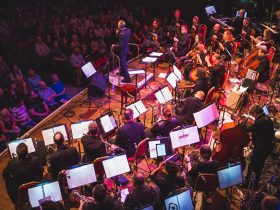You can hear iconic soundtracks and scores from these and other films and TV shows at Sounds for Spies & Private Eyes - a movie and TV theme spectacular celebrating the spy, secret agent and cop shows that dominated both big and small screens in the '60s and '70s. Featuring Charles Hazelwood's 21-piece jazz orchestra, Adrian Utley of Portishead, Will Gregory of Goldfrapp and the Army of Generals string orchestra. Saturday, March 18th, 21:00. Tickets £30-£20.
Get Carter (1971)
This classic movie starring Michael Caine is underpinned by a beautiful, dark jazz score written by the great Roy Budd. Legend has it that, as the budget was so tight, he recorded the whole score with no overdubs, playing live, along to the film which was being screened in the studio.
The Pink Panther (1963)
A classic example of great big band jazz beautifully written and orchestrated by the legendary Henry Mancini.
Bullitt (1968)
Lalo Schifrin was discovered by Dizzy Gillespie in the early ‘60s. After hearing the work he was producing for Gillespie, MGM approached him and he went on to score such classic as Mission:Impossible, Dirty Harry, Starsky & Hutch and countless others.
Our Man Flint (1966)
The ‘Flint’ movies were spoofs on the spy craze that dominated 1960s cinema with music from the pen of Jerry Goldsmith. This percussion heavy masterpiece is full of electric guitars, weird keyboard sounds and big band brass.
Naked Gun (1988-94)
Ira Newborn had already written the music for Ferris Beuller’s Day Off, Planes Trains and Automobiles, Caddyshack and many others when he got the call to write for the Naked Gun franchise. His theme sets the standard for writing and orchestrating big band scores.
The French Connection (1971)
This gritty cop drama and its sequel ushered in a new era of edgier cop movies and the producers needed someone equally cutting-edge to score it. They chose Don Ellis who practically reinvented what a big band was capable of during the ‘60s and ‘70s.
The Ipcress File (1965)
John Barry is most famous, of course, for his work on the James Bond series. So iconic are the Bond films and their scores that his other work is often overlooked. I’m picking Ipcress File for its smooth, classy jazz soundtrack and its iconic theme played on the cimbalom.
Walk, Don’t Run (1966)
Everyone knows Quincy Jones as the producer and arranger for giants such as Frank Sinatra and Michael Jackson but he also scored many movie soundtracks including The Italian Job. Quincy was also staff arranger for the great Count Basie and a trumpeter in Dizzy Gillespie’s big band. He provided the lilting, playful jazz soundtrack to Walk, Don’t Run.
Anatomy Of A Murder (1959)
Jazz genius Duke Ellington wrote this extraordinary score, widely considered to be one of the great jazz film scores of all time. It is dark, brooding, moody and compliments Otto Preminger’s vision perfectly.
Ascenseur Pour L’échafaud (1958)
This movie - featuring an iconic soundtrack by Miles Davis - is a classic piece of crime noir directed by Louis Malle. The group Davis assembled to perform the score were presented with simple, bare sketches of melody or harmony and virtually improvised the score on the spot while the film ran on a projector in the studio.
Charles Hazlewood is a passionate advocate for making orchestral music more accessible to a wider audience. First assembled for the 2008 Glastonbury Festival, Charles Hazlewood’s All Star Collective is an ensemble dedicated to improvisation and features artists from across the musical spectrum.

